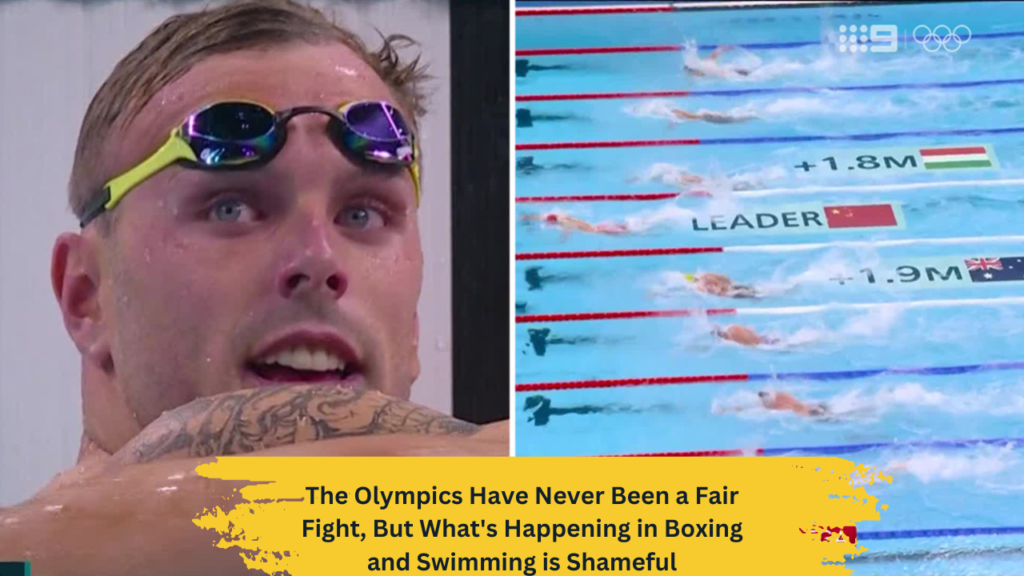The Unfair Reality of the Olympics: Boxing and Swimming Scandals Exposed
The Olympic Games, heralded as the pinnacle of international sports competition, have long been marred by controversies that question the fairness of various events. While the spirit of the Olympics aims to unite athletes from around the world in a display of skill, dedication, and sportsmanship, recent events in boxing and swimming have cast a shadow over this ideal. This article delves into the ongoing issues in these sports, highlighting the challenges and calling for a return to fairness and integrity.

Historical Context: Fairness in the Olympics
The concept of fairness has always been central to the Olympic ethos. From its modern inception in 1896, the Games have strived to provide a level playing field for all competitors. However, history tells a different story. From doping scandals to biased judging, the Olympics have faced numerous challenges in maintaining fairness.
Doping Scandals
The most infamous of these challenges has been the use of performance-enhancing drugs. High-profile cases, such as those involving Ben Johnson and Lance Armstrong, have tarnished the reputation of the Olympics. Despite stringent testing measures, athletes and their support teams have often found ways to circumvent the rules, leading to ongoing distrust among competitors and spectators alike.
Judging Bias
Judging bias has also been a persistent issue. Sports that rely on subjective scoring, such as gymnastics and figure skating, have frequently been accused of favoritism and corruption. These controversies undermine the credibility of the results and erode the spirit of fair competition that the Olympics aim to uphold.
Current Controversies: Boxing and Swimming
Boxing: A Fight Outside the Ring
Boxing at the Olympics has been under scrutiny for years due to questionable officiating and judging. The Rio 2016 Olympics were particularly notorious, with several controversial decisions leading to public outcry and the suspension of referees and judges. Despite promises of reform, the Tokyo 2020 Olympics saw similar issues, prompting calls for a complete overhaul of the system.
Biased Judging
One of the most significant problems in Olympic boxing is biased judging. Athletes and coaches have repeatedly claimed that judges favor certain countries or athletes, leading to unjust outcomes. This bias not only affects the careers of the boxers involved but also diminishes the integrity of the sport.
Corruption Allegations
Allegations of corruption within the International Boxing Association (AIBA) have further tainted the sport. Investigations have revealed instances of bribery and manipulation, suggesting that some matches were fixed long before the athletes stepped into the ring. Such revelations are deeply troubling and call into question the legitimacy of the results.
Swimming: Unequal Opportunities
While swimming has traditionally been viewed as a sport with relatively straightforward rules and clear winners, recent controversies have highlighted significant disparities in training and resources among athletes from different countries.
Technology and Access
One major issue is the disparity in access to advanced training facilities and technology. Swimmers from wealthier nations often have access to state-of-the-art pools, coaching, and equipment, giving them a considerable advantage over competitors from less affluent countries. This inequality contradicts the Olympic spirit of providing equal opportunities for all athletes.
Doping Allegations
Swimming has not been immune to doping scandals either. High-profile cases, such as those involving Chinese swimmer Sun Yang, have raised concerns about the effectiveness of anti-doping measures in the sport. The presence of doped athletes undermines the achievements of clean competitors and casts a shadow over the entire competition.
The Impact on Athletes and Fans
The controversies in boxing and swimming have far-reaching implications for both athletes and fans. For athletes, the perception of unfairness can be demoralizing and damaging to their careers. Many athletes dedicate their lives to training for the Olympics, and to have their efforts undermined by biased judging or unequal opportunities is a profound injustice.
For fans, these controversies erode trust in the Olympic Games. The Olympics are meant to be a celebration of human achievement and the triumph of hard work and determination. When the integrity of the competition is compromised, it diminishes the excitement and admiration that fans have for the Games.
A Call for Reform
The issues plaguing boxing and swimming at the Olympics are complex and multifaceted, but they are not insurmountable. Addressing these problems requires a commitment to transparency, accountability, and the implementation of rigorous oversight measures.
Judging and Officiating Reforms
In boxing, reforms must focus on improving the judging and officiating processes. This could include more stringent selection criteria for judges, regular performance reviews, and increased transparency in scoring. Introducing technology to assist in scoring, such as video reviews, could also help reduce human error and bias.
Equitable Access to Resources
In swimming, efforts should be made to ensure more equitable access to training facilities and technology. This might involve investment in infrastructure in developing countries and the sharing of best practices and coaching expertise across borders. Additionally, maintaining robust and fair anti-doping measures is crucial to preserving the integrity of the sport.
International Collaboration
Finally, addressing these issues requires international collaboration and a willingness to learn from past mistakes. Governing bodies, athletes, coaches, and fans must work together to advocate for a fairer and more transparent Olympic Games. By doing so, we can ensure that the Olympics remain a true celebration of athletic excellence and the human spirit.
Conclusion: Upholding the Olympic Ideal
The Olympics have always been more than just a series of sports competitions; they are a symbol of unity, excellence, and fair play. The recent controversies in boxing and swimming challenge these ideals, but they also present an opportunity for change. By addressing the issues of biased judging, corruption, and inequality, we can restore trust in the Olympic Games and ensure that they continue to inspire and unite people around the world.
